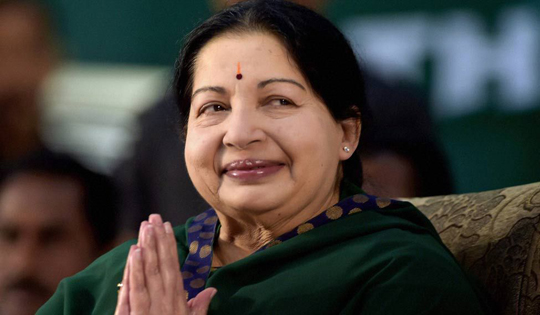Chennai, Dec 6: Her supporters hailed her as 'Amma' (mother) and 'Puratchi Thalaivi' (revolutionary leader); her critics called her a ruthless autocrat who usurped democratic processes. But in a state where the reel is inexorably fused with the real, Jayaram Jayalalithaa proved herself to be one of the most tenacious politicians who served the state as Tamil Nadu Chief Minister for three terms. Known as Tamil Nadu's iron lady, Jayalalithaa, who hails from Mysore, is famous for her tough, spontaneous and populist decisions.

Mentored by her senior acting colleague and former state Chief Minister MG Ramachandran, Jayalalithaa formally joined All India Anna Dravida Munnetra Kazhagam in 1982, at the age of 34. She worked hard to climb the party ranks to become the propaganda secretary, much to the chagrin of seasoned partymen, and was soon nominated to Rajya Sabha. MGR may have brought her to politics, but she rose to the top purely on her own merits, breaking new grounds for women.
When MGR was taking treatment in the US for his illness, AIADMK had to face the Parliamentary and Assembly polls in 1984. Jayalalithaa spearheaded her party to a spectacular victory, proving that she is equal, if not better, than her mentor when it comes to galvanising her party. After MGR's demise in 1987, AIADMK split vertically with Jaya heading one of the factions. In 1989 polls, she was elected from Bodinayakkanur and became the first woman leader of the opposition in Tamil Nadu Assembly.
In February that year, the party united under her leadership and she was elected the General Secretary. In 1991, Jayalalithaa led her party to a crushing victory to become the second woman Chief Minister of the state; MGR's widow Janaki being the first as she led a government that lasted for just 28 days. Jayalalithaa also became the first woman leader to complete a full term in the government, ruling the state from 1991 to 1996.
One specific incident that defined her early career as a legislator was the brawl inside the Tamil Nadu Assembly during which her sari was torn and abuses were hurled at her. A tearful and dishevelled Jayalalithaa left the Assembly complex that day vowing to return as Chief Minister, something she managed with in two years. Allegations of massive corruption made her government unpopular and she lost the 1996 elections to her rival DMK, which lodged several cases against her that she continues to fight until now.
Known for her strict handling of state bureaucrats, Jayalalithaa never hesitated to punish the civil servants who failed to discharge their duties. Jayalalithaa's early years were spent in Bengaluru, where she studied at Bishop Cotton Girl's School. As her family moved to Chennai, she went to the Presentation Convent Church Park School, where, after matriculating in 1964, she won a Government of India scholarship for higher studies.
Her dream of further studies was abruptly cut short, when her mother Sandhya persuaded her to act in films at the age of 16. She soon grew busy acting in Tamil, Telugu, Kannada, Malayalam and even doing a movie in English. Her only English movie titled 'Epistle' was released in 1961 and was produced by Shankar Giri, son of former President VV Giri. The most memorable of her Bollywood movie was Izzat, in which she played opposite Dharmendra, who later joined the BJP.
A voracious reader, Jayalalithaa was known to carry books to the film set and read between shots. Her favourite authors include Charles Dickens, Jane Austen, Oscar Wilde, Bernard Shaw, Danielle Steel, Pearl S Buck and James Hadley Chase. She maintains a large library with several collections. Asked what she thought of the description of her as “iron butterfly”, Jayalalithaa said: “I agree with the description 'iron', but why 'butterfly'? I don't think the word 'butterfly' fits me at all."





Comments
Add new comment